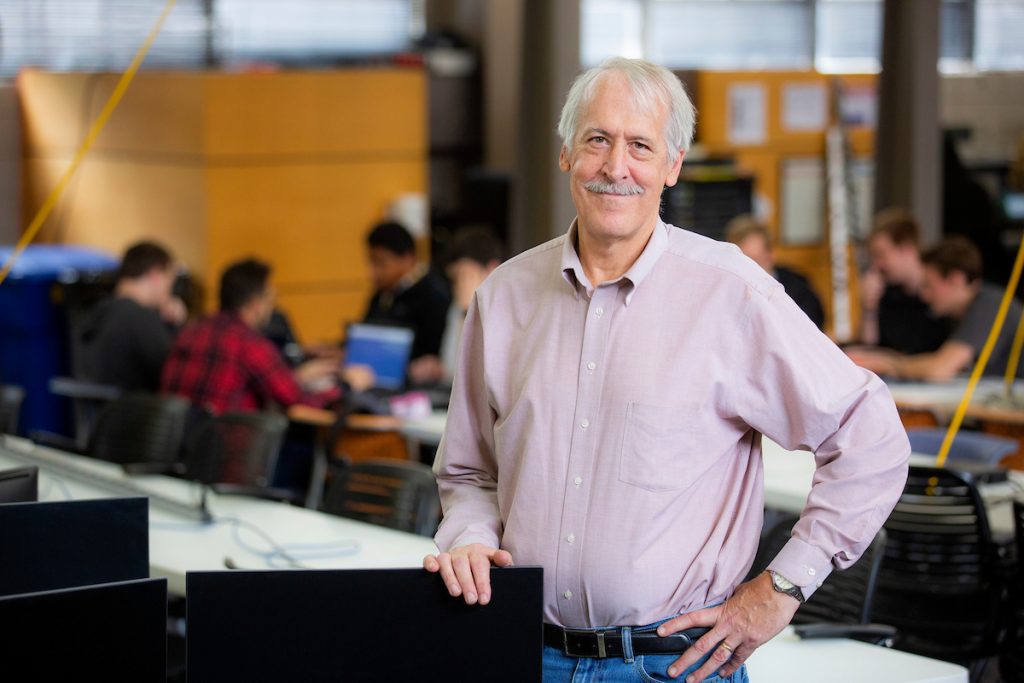A new cybersecurity faculty fellows program has been created within the College of Engineering to equip students with cybersecurity concepts. An inaugural cohort of nine engineering faculty members spans across several departments in the college.

“For years we have been looking on how to put cybersecurity into non-cyber disciplines, because it is so integral to so much of what we do,” said Doug Jacobson, University Professor of electrical and computer engineering (ECpE) and the director of the ISU Center for Cybersecurity Innovation and Outreach. “The idea is to try to insert cybersecurity into the context of a particular course where cyber is important.”
Jacobson’s Stanley Chair for Interdisciplinary Engineering provided the resources that led to the creation of the cybersecurity faculty fellows.
Adversarial thinking
Cybersecurity is vital to all disciplines of engineering as well as everyone’s daily life in our connected world. This program will identify courses where Jacobson will work with the faculty member to develop material to integrate cybersecurity principles into the courses.
“We will start out with basic common modules to introduce students to the concepts of cybersecurity, like adversarial thinking,” Jacobson said. “Anytime we design systems, we need to be thinking about an active adversary, whose goal is to disrupt whatever you are building.”
Historically, this would come down to a physical adversary, so security measures like locks, fencing and guards would all be in play. But in the cyber world of today, an adversary could be thousands of miles away.
Cyber informed thinking
“We need to start thinking about an adversary that isn’t physically there, and learn the concept of cyber informed thinking,” Jacobson said. “We are trying to instill in these students to think in the back of their mind that somebody—using the cyber domain—will try to destroy what you are doing.”
The goal isn’t to change students into cybersecurity engineers, but learning the concepts and principles of cybersecurity, and keeping their thinking cyber informed, will keep vital resources and systems safe from adversaries.
Each of the modules will be tailored to the respective course, and students will learn ways to think about what an adversary might do to make the changes to keep systems and designs safe.
The hope is to expand the integration of cybersecurity concepts across not only the college, but the university as a whole, all in an effort to get students to stay cyber informed.
Inaugural cohort of cybersecurity faculty:
| Kurt Rosentrater | ABE | ABE 469 Engineering for Grain Storage, Preservation, Handling, and Processing Systems |
| Kristin Yvonne Rozier | AERE | AERE/COMS 407/507 Applied Formal Methods |
| Mai Zheng | ECpE | CPRE 308 Operating Systems |
| Adina Howe | ABE | ABE 316 Applied Numerical Methods for Agricultural and Biosystems Engineering |
| Brendan Devine | IMSE | Aero/IE 452 — Intro to Systems Engineering & Analysis |
| Chris Day | CCEE | CE 650B (Traffic Control) or CE 553 (Traffic Engineering) |
| Jonathan Wood | CCEE | CE 552 Traffic Safety, Operations, and Maintenance |
| Lu Liu | CCEE | CE 388: sustainable engineering |
| Berk Gulmezoglu | ECpE | CPR E 381: Computer Organization and Assembly Level Programming |
